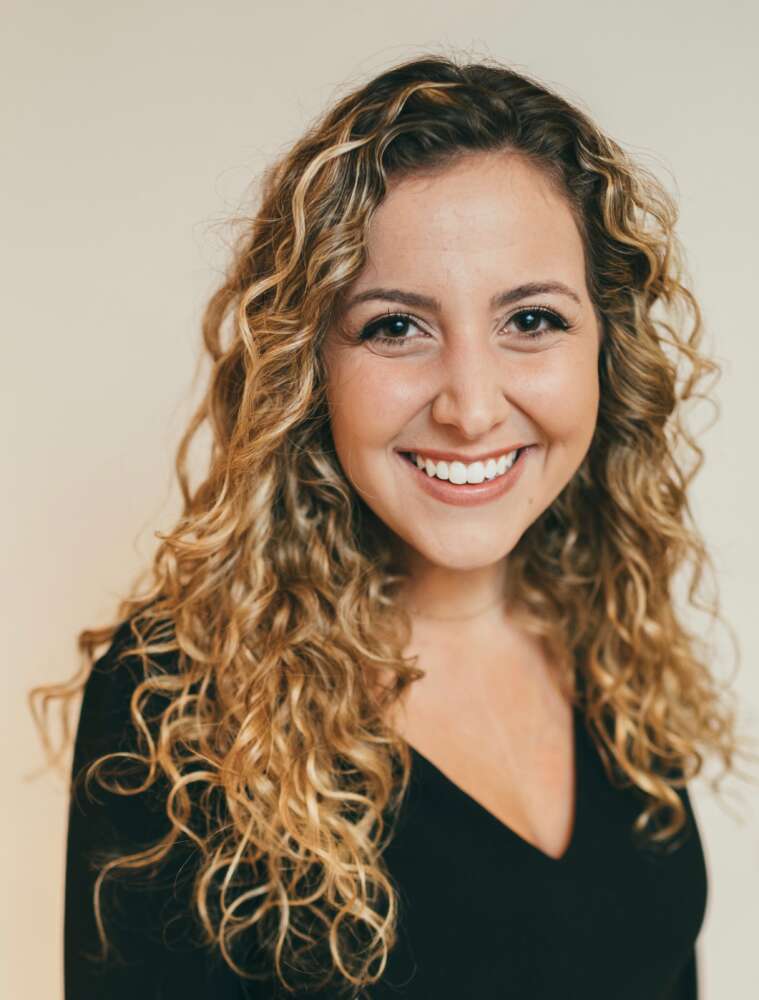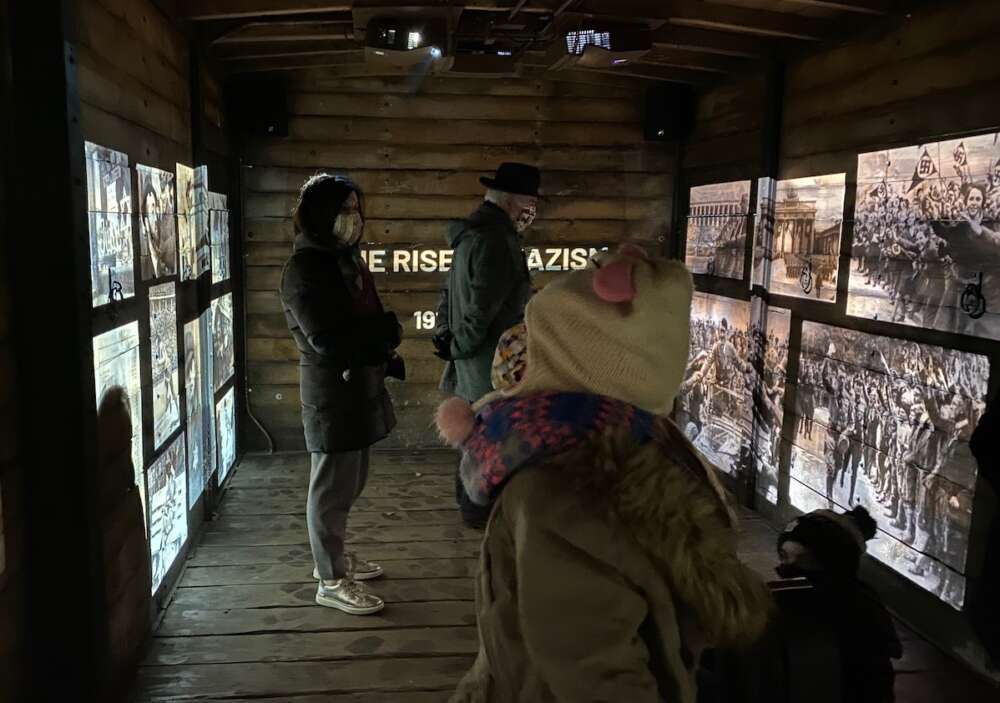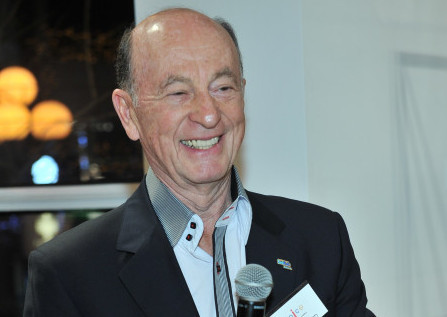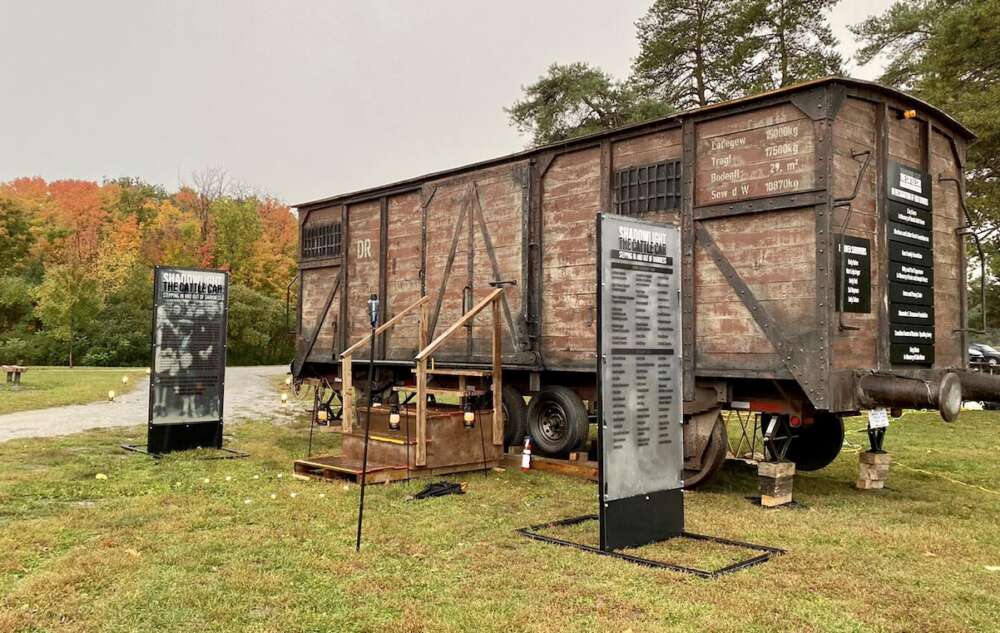A stark reminder of the Holocaust will once again be placed in the heart of the University of Guelph campus during Holocaust Education Week, Nov. 8-12.
A cattle car like those used by the Nazis to transport Jews and other targeted groups to concentration camps, labour camps and extermination camps between 1941 and 1944 is returning to Branion Plaza for the week. The audiovisual exhibit will be open from 10 a.m. to 4:30 p.m.

U of G alumna Jordana Lebowitz is the founder and executive director of Shadowlight, a social justice organization dedicated to inspiring action for a brighter future through Holocaust education. She has a BA in psychology from U of G and an M.Ed. from the University of Southern California.
The Cattle Car: Stepping In and Out of Darkness, is one of Shadowlight’s projects, and was first conceived by Lebowitz when she was a U of G student.
While it is a stirring glimpse into the horrors of the Holocaust, the cattle car exhibit also aims to inspire hope and action for a better future.
As a U of G student and volunteer for Hillel Guelph, the Jewish student organization at the University, Lebowitz was responsible for Holocaust Education Week programming beginning in 2015. Her idea that year was to mount an exhibit inside and around a historic cattle car. A replica of one was found in Toronto and transported to U of G for the event. In the two days it was on campus, it attracted more than 2,000 visitors and much media attention.
“It provides a window into another world, into the experiences of survivors and those forced into the cars, whose lives were forever changed by being on those trains,” said Lebowitz, who is touring The Cattle Car throughout Ontario. “I think it helps people empathize with the stories of others.”

In audio recordings that are part of the exhibit, Holocaust survivors tell their stories of loss and suffering but also express their hopes for the future, one free of prejudice, intolerance and hatred. They encourage others to dedicate themselves to bringing about such a future by working to eliminate discrimination and ensure genocide never happens again, Lebowitz said.
Gila Cotler, director of Hillel Guelph, said the visual impact of the cattle car sparks curiosity and invites conversation.
“It opens the door for conversations about the importance of Holocaust education – about the imperative we have as the last generation that can bear witness to the horrors of the Holocaust first-hand,” Cotler said.
As the Holocaust fades from recent memory and the number of first-hand witnesses to the atrocities dwindle, it is essential to pass on the universal messages of this history, Cotler and Lebowitz said.
“With the first exhibit in 2015, we really wanted to give U of G students a powerful experiential learning experience,” Lebowitz said. “It has been shown that the type of learning that inspires the most motivation to take action is learning that is relevant, emotional and experiential. We’ve expanded on that first exhibit, making it more unique and impactful.”

A virtual presentation by Holocaust survivor Sol Nayman will also be part of Holocaust Education Week at U of G. Nayman, who dedicates his life to talking to young people about the Holocaust, was born in Stoczek Wegrowski, or Stok, a small village near Warsaw, Poland.
As Polish Jews were being rounded up and transported by train to the camps, his family was forced to flee the country with only a few personal items, including a few pieces of silverware, to their names. Nayman was four years old. They made their way into the Soviet Union, where they spent five years in a labour camp. All survived.
A Zoom presentation with Sol Nayman will take place on Thursday, Nov. 11 at 7 p.m.
In previous presentations, Nayman has said the Holocaust was an extension of antisemitism and driven by antisemitic propaganda. He is motivated by the principle that if we don’t remember history or forget it, it will repeat itself.
“Hopefully, many will come to have a conservation, come to hear a Holocaust survivor speak and join us for a Shabbat dinner in unity, where we celebrate our differences that bring us together,” Cotler said. “The week serves as a moment of remembrance and reminder for all of us.”
Lebowitz knew she wanted to be an advocate for social justice and Holocaust awareness when she was in high school. She was part of March of the Living, an annual educational program in Poland, where students learn the history of the Holocaust, explore the remnants of concentration camps, and examine the roots of prejudice, intolerance and hatred.
“I was very fortunate to be able to stand in the spaces where these atrocities happened,” she said. “I felt very close to the victims. It was like they spoke to me. I felt I had a responsibility to help create the world that they would have wanted.”
“Never again” is one of the slogans of Holocaust remembrance, Cotler said.

“But we are all witnesses to horrible atrocities taking place over and over again in our world,” she said. “We need only look at the Tigray Region in Ethiopia and the horrible situation with the Hazaras people in Afghanistan. We have an imperative to stand up, speak out and make sure none of these atrocities happen again.”
Because of the horrifying nature of the information shared during the weeklong event, a “processing space” will be provided. A virtual Zoom space will be offered to ask questions and access more information. It begins Friday, Nov. 12 at 11 a.m. RSVP to Hillel Ontario.
Students and staff will also be given a small gift box containing a number of items, including a journal to record their thoughts, a memoir of a survivor and a memorial candle. RSVP to the same email address to receive one. An open Shabbat dinner will take place on Friday at 7 p.m. for students, staff or faculty of U of G, using the same RSVP email.
There has also been a general increase in hate in Canada and around the world during the COVID-19 pandemic, including rising antisemitism and xenophobia, Cotler added.
“It is incredibly concerning, and that is why we do events like this, to bring our community together so we can combat it together. We are stronger together, shoulder to shoulder, than we are alone.”
Contact:
Jordana Lebowitz
jordana@myshadowlight.org
917-650-3690
Gila Cotler
gila.cotler@hillelontario.org
416-913-2428, ext. 5